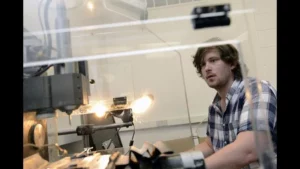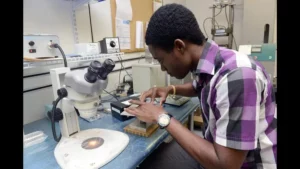Potomac Photonics greatly appreciates when our innovations in advanced manufacturing and workforce development are recognized. Recently, two media outlets talked with our President and CEO Mike Adelstein, as well as our staff, to explain our unique 21st century approach to the factory floor.
Baltimore Sun: micro-manufacturing company doesn’t sweat the small stuff

Of course, most of that first hand look was through a microscope. Jon quotes our President and CEO Mike Adelstein as saying, “if you can see it, we didn’t do it.” From microfluidic devices to medical sutures to all sorts of new approaches to personalized medicine, helping researchers and companies miniaturize products is key to Potomac’s work.
Check out the entire story on line here. It includes features of several Potomac staff who don’t sweat the small stuff while manufacturing new products utilizing advanced manufacturing.
Manufacturing Talk Radio: the Star Trek Machine Shop

In describing Potomac’s micromachining work, Mike explained that 3D Printing is a great tool but it cannot always complete a job. “In many cases”, says Mike, “we use 3D Printing to fabricate 75% of a part, and then finish it with laser micromachining or other machine tools.” Mike reiterated that we must re-invest in new technologies in order to meet our customer needs and in doing so build a toolbox from which to choose the best tool for the job. Combining smaller machines, agile production systems, and automation is leading us to the future of manufacturing.
But it was Potomac’s expertise in making small parts that really got Tim and Lew’s attention. It became clear in the interview that the manufacturing tools of the future were changing everything about the factory floor. Mike described how Potomac makes parts for the biotech, medical device, and microelectronics industries in a clean, futuristic work environment that is not the old factory of the 1st Industrial Revolution. The Manufacturing Talk Radio hosts declared: “Sounds like the Star Trek machine shop, not your father’s machine shop.” When we think about it, yes, that’s a pretty good description of Potomac!
In being asked about the much-discussed Skills Gap, Mike described Potomac’s successful internship programs with the University of Maryland, Baltimore County and Fab Lab Baltimore at the Community College of Baltimore County. The hosts opined that advanced technology like robotics will actually increase job opportunities and Mike agreed. “It’s about training & looking forward. People in the US are better than just bringing back jobs from overseas. We need Americans to fill jobs at the next level in advanced manufacturing.”
You can hear the entire interview online here with much more about innovation, advanced manufacturing, education and the factory of the future.


